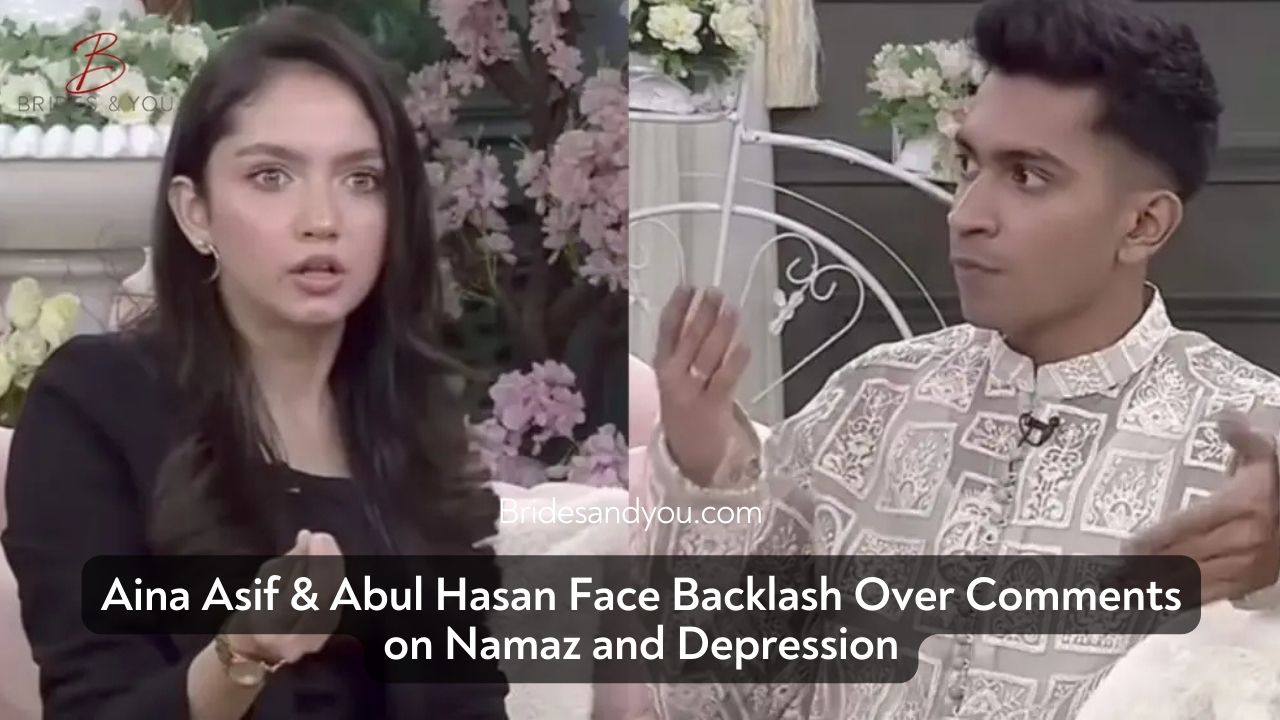Now Reading: Aina Asif & Abul Hasan’s Views on Namaz and Depression Stir Public Controversy
-
01
Aina Asif & Abul Hasan’s Views on Namaz and Depression Stir Public Controversy
Aina Asif & Abul Hasan’s Views on Namaz and Depression Stir Public Controversy

Mental health has become a pressing concern in today’s fast-paced world, and public figures speaking up on the topic often ignite heated debates—especially when religion is involved. Recently, rising Pakistani star Aina Asif and her co-actor Abul Hasan found themselves at the center of a social media storm after making comments about Namaz (Islamic prayer) and depression during a morning show appearance.

The Rising Star: Aina Asif’s Growing Popularity
Aina Asif, a young and talented actress, has rapidly climbed the ladder of success in the Pakistani drama industry. Known for her natural acting skills and expressive performance, she has won hearts with her roles in blockbuster serials such as Mayi Ri, Baby Baji, Hum Tum, Pinjra, and Pehli Si Muhabbat. Currently juggling her academics and professional career, Aina is making waves again with her latest projects Judwaa and Parwarish.
She recently appeared on Good Morning Pakistan with co-actor Abul Hasan to promote their new drama serial Parwarish. It was during this interview that the duo made statements that sparked a fiery debate online.

The Controversial Statement on Depression and Namaz
In the show’s segment discussing emotional well-being and mental health, Aina shared her thoughts on how depression should be treated. She candidly expressed that while Namaz is important, it’s not always a standalone solution for mental health issues. Her exact words were:
“Sometimes, therapists are really mean, your kid will go to seek medical help and they will say, ‘Recite Namaz’—yes, Namaz is important—but what can I do in that moment when I am depressed?”
Abul Hasan supported her statement and added:
“For a cure, we need a therapist; we can’t rely on Namaz for all our solutions. Allah has given us a mind to think—we should go to a therapist to seek medical help.”
Their remarks, while intended to promote awareness about mental health and the importance of seeking professional therapy, were perceived by many as dismissive of religious practices.
Public Backlash on Social Media
Almost immediately after the episode aired, clips from the show began circulating on various social media platforms. The online community reacted strongly, with many users criticizing the actors for touching upon religious subjects without enough knowledge or authority.
One user posted:
“Now these professional actors and influencers will teach us Islam?”
Another quoted from the Holy Quran:
“Seek help through patience and prayer.”
Many emphasized the spiritual benefits of Namaz, calling it the ultimate source of peace and healing. Comments like:
“Namaz is undoubtedly the cure for all problems,”
and
“For me, Namaz is the ultimate source of peace; it has been a lifelong experience,”
flooded platforms like Instagram, Twitter, and Facebook.
Some even labeled the statements as being aligned with “liberal” ideologies that challenge traditional values. One comment read:
“Namaz is obligatory; why do liberals get offended when encouraged to pray?”
Balancing Faith and Mental Health: A Bigger Conversation
This controversy reveals a deeper issue—how society approaches mental health in religious communities. While faith and prayer are undoubtedly powerful and healing tools, clinical depression and anxiety disorders are medical conditions that sometimes require professional intervention.
There’s no denying that Namaz brings spiritual peace, but for many, it might not be enough to combat the complex layers of mental illness. Experts often recommend a combined approach that includes therapy, medical treatment, and spiritual practices. The conversation Aina and Abul initiated—knowingly or unknowingly—has spotlighted the urgent need to educate people about mental health without undermining religious beliefs.
Conclusion: A Call for Compassion and Understanding
In a world where millions silently suffer from mental health struggles, it’s crucial that discussions about treatment are approached with empathy and awareness. While the backlash faced by Aina Asif and Abul Hasan is rooted in strong faith-based sentiments, their core message was about acknowledging depression as a real illness that sometimes needs professional help.
Instead of vilifying young voices trying to address important issues, we should strive for a more open and informed dialogue—one where faith and mental health support each other, rather than stand in opposition.










